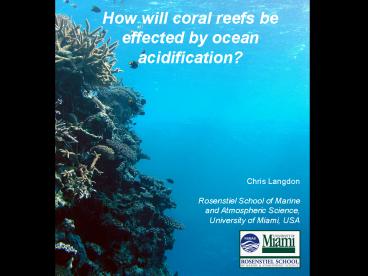Chris Langdon - PowerPoint PPT Presentation
1 / 11
Title: Chris Langdon
1
How will coral reefs be effected by ocean
acidification?
Chris Langdon Rosenstiel School of Marine and
Atmospheric Science, University of Miami, USA
2
Ocean Acidification
As the CO2 content of the atmosphere increases
much of it dissolves into the ocean causing the
pH to drop. The pH has already dropped 0.1 units
since 1850 and it could drop by 0.3-0.4 units by
2100.
3
Projections for the year 2100
- pCO2 540-960 ppm
- Ocean acidification (decrease of 0.2 to 0.4 pH
units). - Resulting in a decrease in aragonite saturation
state of 1.5 to 2.6 units. - Based on experimental data this could result in a
40-70 decrease in the rate of coral
calcification.
4
Most recent compendium of coral data (12 species)
Depending on the model, coral calcification
changes by 23-28 per unit change in aragonite
saturation state
5
Creating a 4-level scale of how coral growth
changes with saturation state
of pre-industrial Growth rate
80-100
60-80
40-60
20-40
1850
2100
2007
6
(No Transcript)
7
(No Transcript)
8
(No Transcript)
9
Balance of carbonate production and destruction
on coral reefs
Deficit
A doubling pCO2 could push many coral reefs into
a negative mass balance
10
Conclusions
- Within the next 50-100 years ocean acidification
could push coral reefs beyond their tipping
point. - If the effects of rising temperature are also
factored in the tipping point could come even
sooner. - Corals and other affected organisms may be able
to adapt fast enough to prevent extinction but
probably not before the ecosystems are seriously
degraded. - The root cause of the warming and the
acidification is the same, emission of CO2 gas
due to the burning of fossil fuels. Creation of
Marine Protected Areas (MPAs) may buy time by
relieving other stressors but are unlikely to
save coral reefs by themselves. - More studies can improve the accuracy of the
predictions but how accurate the predictions need
to be before we decide to act is a philosophical
and political decision not a scientific one.
11
Some final thoughts
- In the Caribbean and the Pacific many small
island nations are heavily reliant on their coral
reefs for tourism, food and coastline protection.
They will be hurt far worse than the US if their
corals reefs are seriously degraded and they have
less resources with which to cope. - Do we have a moral obligation to help these
people because we contributed in large share to
the pollution that created their problem?































